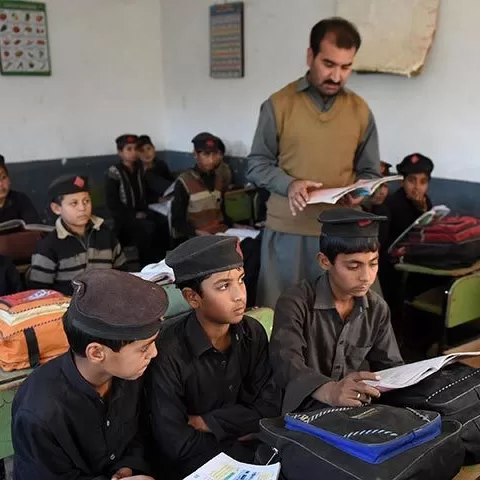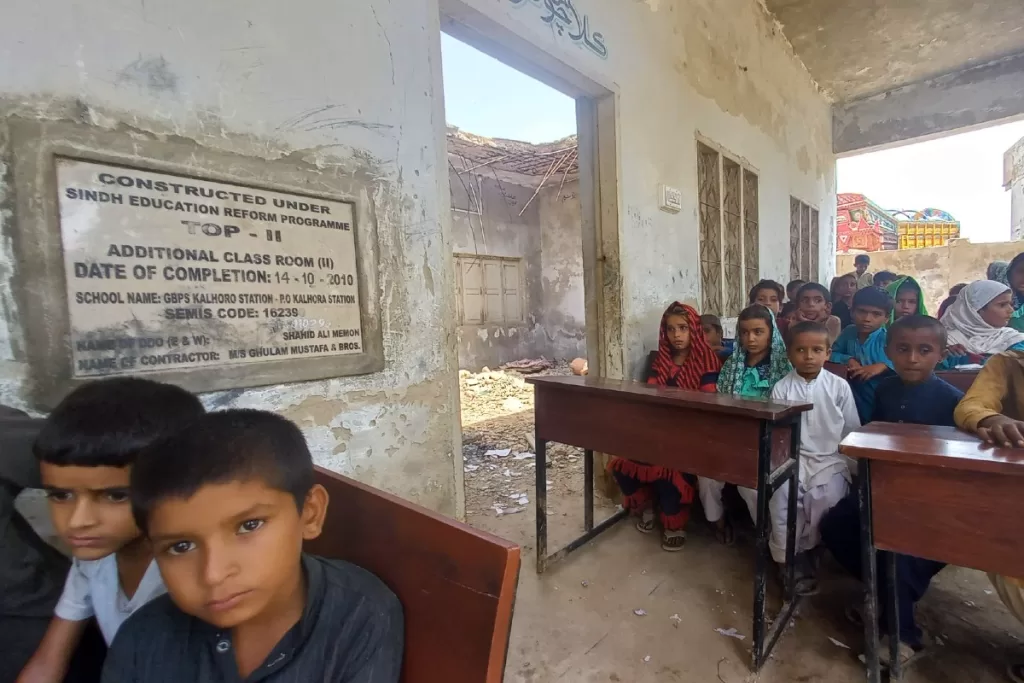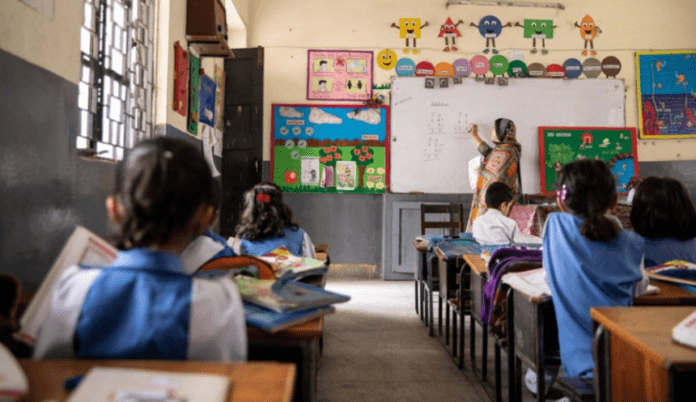Education in Pakistan remains a challenging terrain, particularly for middle-class families striving to secure quality learning opportunities for their children. Despite constitutional guarantees like Article 25-A mandating free and compulsory education for children aged 5 to 16, the country grapples with systemic issues. According to the World Bank, Pakistan has a 77% learning poverty rate which is higher than India, Bangladesh, and Sri Lanka. This means that most children in Pakistan cannot read and understand a simple text by the age of 10, a foundational skill that determines future academic and career success. With 182,600 functional primary schools, 46,800 middle schools, and 34,800 secondary schools, the infrastructure exists, but disparities in quality and access persist. These gaps place middle-class families in a precarious position, as they navigate inadequate public education systems and expensive private alternatives. Without urgent action to address learning poverty and bolster educational quality, Pakistan risks perpetuating human capital deficits, undermining its developmental aspirations and leaving millions of children ill-equipped for the demands of the modern world.
As a middle-class person, I have experienced the hardships that come with trying to receive a good education. The challenges are complex, multifaceted, and often deeply frustrating, and they reflect the broader reality faced by millions of Pakistanis who fall between the cracks of the country’s educational system.

The Price of Education
One of the biggest problems for the middle class is the high cost of education. Public schools, which are supposed to provide quality education have crowded classrooms, old curriculums, and a lack of basic resources. That’s why many middle-class families prefer private schools; however, private schools are quite costly. Tuition fees, books, uniforms, extracurricular activities, and transportation costs add up to a significant amount, making it very hard for families to manage their budgets. The bitter truth is that middle-class families cannot afford expensive schools nor do they qualify for government help for low-income families. The result? A constant juggling act between providing for children’s education and meeting basic living expenses. Low income families often retain the books of an older child to give to the younger one or share them with cousins and other relatives, this aptly shows the financial difficulties faced by families. By reusing books, money can be saved for other expenses like school fees, uniforms, or tuition classes.
While this helps reduce some of the financial pressure, it highlights the bigger problem in the Pakistani Educational system – access to affordable education is still a luxury and inaccessible for the majority. It is ironic that families from the Middle-class make tough choices every month between basic needs and educational resources for their children. They have to compromise and struggle for a bright future for their children.
For many middle-class families, the dream of sending their children to a good school often remains a pipedream; instead, they end up choosing a school that has lesser fees, in reality some families have to take loans or use their savings to pay for tuition, hoping it will bring better opportunities in the future. But in a system where quality education is mostly reserved for the rich, this seems an impossible task.
Inadequate Resources and Emotional Toll
Another major problem is the quality of education; while middle-class families work hard to provide their children the best education, the system often disappoints them. Unfortunately, all governments have invested very little in improving the education system. One problem is the quality of teachers and their absenteeism; 14% of public school teachers are absent daily while many lack sufficient knowledge on the subject they are teaching. Only 60% of Khyber Pakhtunkhwa teachers passed a 5th grade mathematics exam, compared to 40% of their students as reported by the World Bank last year.
Many issues faced by teachers contribute to the problem, they are mostly underpaid, overworked and cannot give enough attention to each student. As a result, students do not receive much-needed attention and quality education from teachers. While private schools are better in some ways, they too are not the perfect solution as they too have issues – focusing heavily on memorization, not teaching core concepts, and using old teaching methods. Even though private schools are quite expensive, they also fail to provide quality education. This failure of Pakistan’s education system not only affects children’s academic performance but also their overall well-being as stress and anxiety build up in students as they are pushed through an educational system that is often indifferent to their emotional and psychological needs. This mental trauma is not only affecting students and children but parents as well, as they feel helpless when unable to finance quality education. The constant financial problems, along with the pressure to excel can seriously affect the mental and emotional health of middle-class families. The stress of paying school fees, buying books, and trying to keep up in a system that favors the rich can feel like too much to handle.
I have had moments where I have questioned whether all the sacrifices—missing out on family events, cutting back on personal expenses—are worth it. There’s a constant worry that if my children don’t make it through the system, they too will end up as part of the unskilled, underpaid labor force that makes up much of Pakistan’s workforce.
We are rarely given the space to voice our frustrations or to ask for help because almost everyone around us is facing the same struggle, so we silently keep bearing the burden, hoping that somehow, it will all work out. But for many of us, it feels like we are running—working harder and harder, but getting anywhere.
The Pressure of Social Expectations
There’s also the societal pressure to “keep up.” As a middle-class citizen in Pakistan, one feels the weight of expectations, not just from your family but from society at large. Education is viewed as a gateway to opportunities. The assumption is that if you get the right Degree from the right school, you will land the right job and achieve financial stability. But, this is far from the reality.
Employment opportunities in Pakistan are limited and even the best Degrees do not always guarantee a job. The time, money, and efforts middle-class families spend on education often feel wasted when their children graduate only to face a job market with few job opportunities or offers with very low salaries that cannot even support a decent life in Pakistan. Many middle-class students are left feeling disappointed, having invested so much into their education, only to end up in roles that do not reflect their academic qualifications or the dreams their families had for them. It’s an irony: the better your education is, the higher the expectations, and the more devastating the disappointment when those expectations go unmet.

A Broken System The Need for Reform
The problems faced by Pakistan’s middle class in education are not just personal struggles but reflect a deeper problem in the system that needs urgent changes. The government must seriously address these issues and create an education system that is fair and accessible to everyone equally. Public schools need immediate attention. Teachers must receive higher salaries, and they must receive quality training. Private schools must be held responsible and must ensure the high fees they charge match the quality of education they provide but most importantly, we need a system that understands the situation of the middle class – people who cannot afford the best schools but also do not qualify for government help.
Education is a fundamental right, not a privilege. The hope for a better future for our children should not destroy our peace of mind. As someone from the middle class who has struggled with this system, I can only hope that one day the system will improve. Until then, the fight for quality education continues – a fight that millions of middle-class Pakistanis know all too well where problems of access, quality, infrastructure and inequality of opportunity remain endemic.
Non-Governmental Organisations (NGOs) for Hope
There is a ray of hope in the form of NGOs, Foundations, and Institutions working to improve education. Many of these organizations focus on providing essentials to the needy, such as education, food, and shelter, and work to improve the future of impoverished children. Their initiatives are doing their best to make a difference. Efforts by non-profit organizations demonstrate that change is possible with the right kind of support. Education remains a powerful tool to empower and bring change in future generations. While Pakistan’s education system needs improvement, the efforts of these organizations give hope to those of us who continue to dream of a better future for our children. Despite the many challenges we face, there are people working hard to ensure that knowledge—and the opportunities it creates—remains accessible to everyone.





